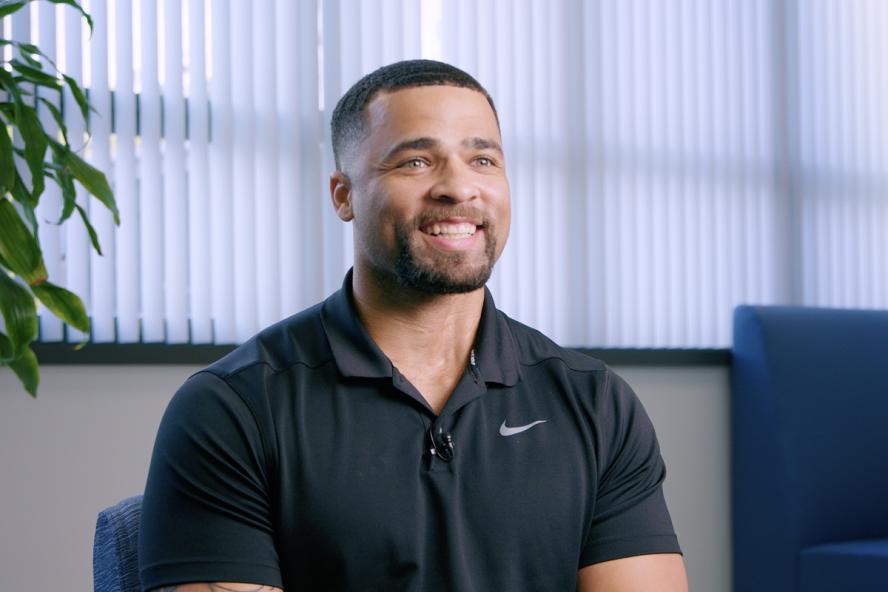-
About
- Departments & Offices
-
Academics
- Public Health
- Biomedical Sciences
- Physician Assistant
- Special Master’s (MBS)
-
Admissions & Financial Aid
- Tuition & Fees
-
Student Experience
-
- Student Resources by Program
- Academic & Student Support
- Wellness & Wellbeing
- Student Life
- Events & Traditions
-
-
Research
- Research Labs & Centers
- Tufts University-Tufts Medicine Research Enterprise
-
Local & Global Engagement
- Pathway & Enrichment Programs
- Global Health Programs
- Community Engagement
Brandon Boyd, DPT25
“This path isn’t just about a title or a degree—it’s about purpose, representation, and building something that lasts beyond me.”

What inspired you to pursue your degree, and how has your personal journey shaped your career goals?
What inspired me to pursue my degree was a deep desire to be part of something bigger than myself—to help heal, represent, and uplift. As a Black man, I’ve seen firsthand how underrepresented we are in doctoral professions, and I knew early on that I wanted to change that narrative. My own experiences with injury and recovery fueled a passion for healing—not just physically, but holistically. Every step of this journey has been shaped by those moments of pain and resilience, and by a vision to create a legacy that my family can be proud of. This path isn’t just about a title or a degree—it’s about purpose, representation, and building something that lasts beyond me.
How have your experiences at Tufts prepared you for your future career?
My experiences at Tufts have prepared me to step into my future career with confidence and a strong sense of purpose. I’ve learned the importance of speaking up when it matters—not just for myself, but for those whose voices may not always be heard. Through both academic and leadership opportunities, I’ve developed the ability to lead from the front: to take initiative, stand by my values, and create space for collaboration and growth. Tufts has given me the tools to not only navigate challenges but to face them head-on with clarity and conviction.
If you could go back to before you started at Tufts and give yourself one piece of advice, what would it be?
If I could return to pre-Tufts me, I’d sit myself down, hand over a giant cup of coffee (because we’re gonna need it), and say: “Listen up, KING—it’s not selfish to prioritize you.” I’d remind myself that burning out isn’t a badge of honor, and that leaning on the people who love you doesn’t make you weak—it makes you human (and keeps your group chat alive). Basically: less ‘I got this all alone,’ more ‘I got this… with an adult beverage, support, and some solid boundaries.’
What advice would you offer to prospective students based on your own experience?
I’d tell prospective students what a wise mentor once told me: lean into the experience. Not just the highlight reel stuff—the wins, the group photos, the perfectly color-coded planner days—but also the messy, chaotic, ‘why-is-my-laptop-crashing-at-2AM’ parts. Failure? Yeah, it’s not just possible, it’s basically part of the syllabus. But here’s the thing: failure doesn’t write your future—you do. You are the master of your fate, the captain of your soul—and occasionally, the CEO of late-night existential crises. Embrace it all. You’ve got more power than you think. You are ENOUGH!
What areas of physical therapy are you most passionate about and why?
I’m most passionate about preventing recurring orthopedic injuries in active adults and athletes, as well as addressing spinal cord injuries. Having seen how repeated injuries can sideline people from the activities they love—and impact their long-term quality of life—I’m driven to be part of the solution through proactive care and evidence-based prevention. Additionally, spinal cord injuries present some of the most complex and life-altering challenges in the field, and I’m inspired by the opportunity to support recovery and improve function in ways that truly change lives.
What impact do you hope to make in the field of physical therapy?
I hope to increase awareness of the critical role physical therapists play in overall health and recovery, especially as advocates for proactive care and long-term wellness. At the same time, I’m deeply committed to highlighting the importance of representation in the medical field. By showing up as my authentic self, I want to inspire future generations—particularly those who haven’t always seen themselves reflected in healthcare—to pursue this path and know that they belong. It’s about healing bodies, yes, but also about shaping a more inclusive and understanding future for the field.